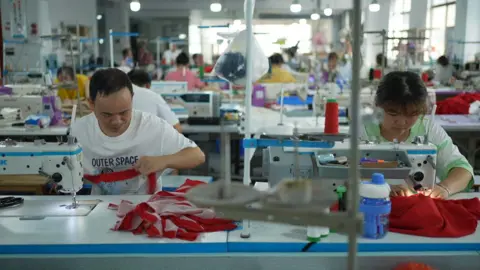Could President Trump’s tariffs spur a recession?
An economist cautions consumers about a potential economic downturn arising from President Donald Trump’s trade policies.
President Donald Trump has promised to promote electricity production at U.S. coal plants as he persists in his effort to provide affordable energy while minimizing environmental concerns.
“After years of being hindered by Environmental Extremists, Fanatics, Radicals, and Thugs, allowing other nations, especially China, to gain considerable economic advantages over us through the opening of hundreds of coal-fired power plants, I am directing my Administration to immediately start producing energy with BEAUTIFUL, CLEAN COAL,” Trump stated in a late Monday social media post.
This week, Trump also indicated that the U.S. does not expect any exemptions on significant tariffs set to take effect next month, despite concerns that these tariffs might elevate prices, spark a recession, and depress stock values.
Speaking to reporters on Sunday, Trump asserted that the 25% tariffs on all steel and aluminum imported into the U.S., which began last week, will remain enforced. He mentioned that further tariffs will be implemented on April 2, a date he described as a “liberating day.”
Despite recent market volatility, stocks saw an increase for the second consecutive session on Monday, ignoring recession fears following Treasury Secretary Scott Bessent’s refusal to discount that possibility. Bessent’s remarks came after Trump opted not to comment on a potential recession this year, telling Fox’s Maria Bartiromo earlier this month, “I hate to predict things like that.”
A tariff serves as a tax levied on imports from foreign nations. Economists largely concur that trade barriers can lead to higher consumer prices and adversely affect economic output and income, as noted by the Tax Foundation, a nonpartisan tax policy organization.
While tariffs may stimulate demand for domestic manufacturers, those companies are also part of the global supply chain and are thus impacted by tariffs as well.
Trump has stated that his rationale for imposing tariffs is to gain cooperation from China, Canada, and Mexico in addressing the influx of migrants and illegal drugs into the U.S. The president has maintained that these countries have not done enough to tackle what he views as pivotal issues for his administration.
– Kinsey Crowley and Jonathan Limehouse
Trump has refrained from commenting on whether he believes his comprehensive tariff strategy could lead to a recession. However, the prospect of tariffs combined with the rising costs of everyday items is fueling concerns about the economy’s trajectory.
A recession might be triggered if employment declines, major firms experience reduced profits, the stock market falls, and housing prices decline, as per the International Monetary Fund’s insights.
Typically, a recession is characterized by a prolonged period of economic decline lasting several months or more. Even when experts and officials recognize a recession, there is often disagreement regarding its start and end dates.
− Damon C. Williams and Zachary Schermele
Contributing: Medora Lee










 Bengali (Bangladesh) ·
Bengali (Bangladesh) ·  English (United States) ·
English (United States) ·